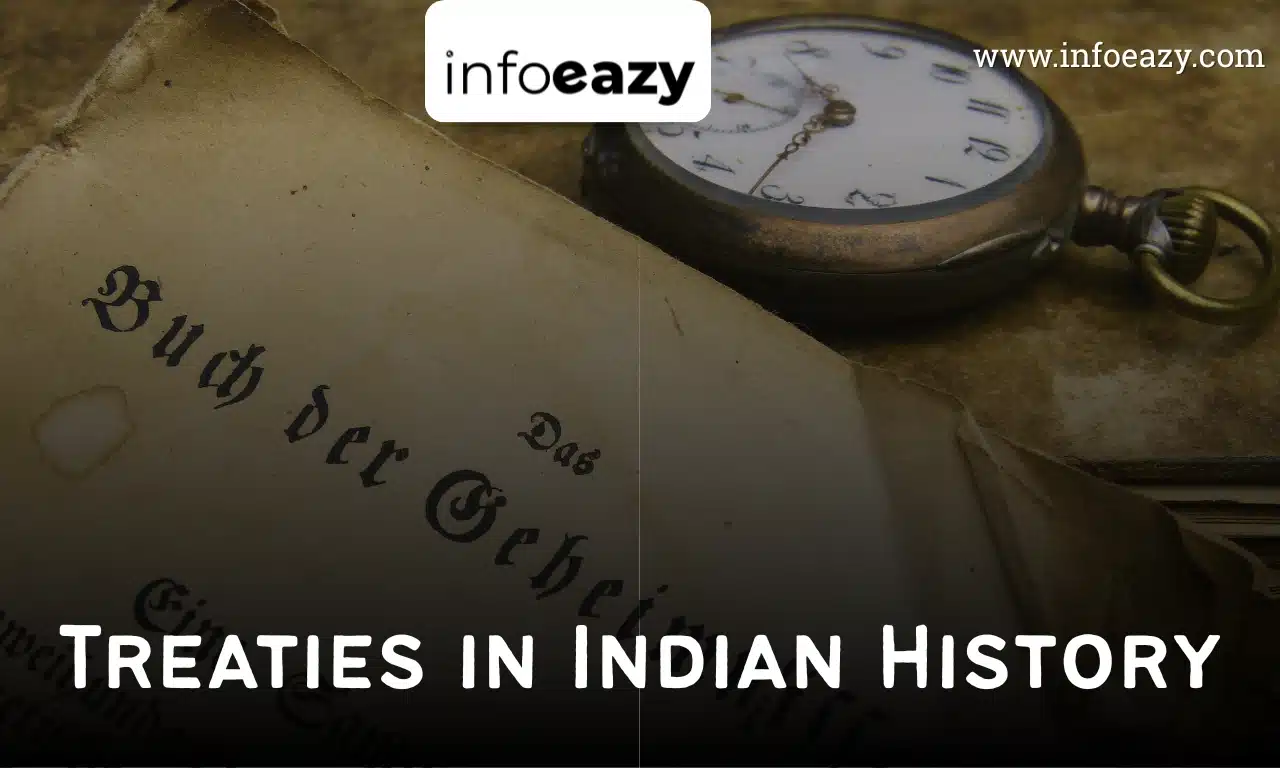Throughout Indian history, treaties have played a pivotal role in shaping the subcontinent’s political landscape. From ancient dynasties to colonial conquests and post-independence diplomacy, treaties marked the end of wars, defined territorial boundaries, established trade alliances, and reflected power transitions. These agreements, signed either between Indian rulers or with foreign powers, were often driven by military outcomes, diplomatic negotiations, or imperial ambitions. Understanding these treaties helps trace the evolution of Indian polity through various historical periods.
List of All Treaties in Indian History
Treaties have been crucial in shaping the course of Indian history, marking the end of wars, defining territorial boundaries, and establishing political control. The table below provides a concise list of major treaties across different periods in Indian history.
| List of All Treaties in Indian History | |||
| Treaty Name | Year | Parties Involved | Key Outcomes |
| Treaty of Asurar Ali | 1639 | Mughals and Ahoms | Defined boundary in western Assam; ended Mughal incursions |
| Treaty of Purandar | 1665 | Shivaji and Raja Jai Singh (Mughals) | Shivaji surrendered 23 forts, retained 12, became Mughal vassal temporarily |
| Treaty of Bhopal | 1738 | Marathas and Mughals | Nizam ceded Malwa; Mughals paid indemnity after Maratha victory |
| Treaty of Aix-la-Chapelle | 1748 | British and French (Carnatic War I) | Madras returned to British; temporary peace established |
| Treaty of Pondicherry | 1755 | British and French | Established peace after Second Carnatic War; conflict resumed soon after |
| Treaty of Paris | 1763 | British and French | Ended Third Carnatic War; French limited to trading posts |
| Treaty of Alinagar | 1757 | Siraj-ud-Daula and British | British got fortification rights and trade concessions in Bengal |
| Treaty of Allahabad | 1765 | British (Robert Clive) and Mughal Emperor | East India Company received Diwani rights for Bengal, Bihar, and Orissa |
| Treaty of Madras | 1769 | British and Hyder Ali | Ended First Anglo-Mysore War; restored conquered territories |
| Treaty of Faizabad | 1775 | British and Nawab of Awadh | Gave British control of Banaras territory |
| Treaty of Purandar (Marathas) | 1776 | British and Marathas | Recognized Raghunath Rao; British influence increased |
| Treaty of Wadgaon | 1779 | British and Marathas | Maratha victory forced British withdrawal from Pune |
| Treaty of Salbai | 1782 | British and Marathas | Brought peace for 20 years; retained territorial status quo |
| Treaty of Mangalore | 1784 | British and Tipu Sultan | Ended Second Anglo-Mysore War; restored captured territories |
| Treaty of Seringapatam | 1792 | British, Marathas, Nizam vs. Tipu Sultan | Tipu ceded half of his territory; paid heavy indemnity |
| Treaty of Bassein | 1802 | British and Baji Rao II (Peshwa) | British gained dominance over Marathas; subsidiary alliance signed |
| Carnatic Treaty | 1801 | British and Nawab of Arcot | British gained control over Carnatic; Nawab became a pensioner |
| Treaty of Sugauli | 1816 | British and Nepal (Gurkhas) | Nepal ceded territories; established current India-Nepal border |
| Treaty of Lahore | 1846 | British and Sikhs | Ended First Anglo-Sikh War; Sikhs paid war indemnity |
| Treaty of Amritsar | 1846 | British and Raja Gulab Singh | Kashmir sold to Gulab Singh by British |
| Treaty of Gandamak | 1879 | British and Sher Ali (Afghanistan) | British gained control of Afghan foreign affairs |
| Treaty of Rawalpindi | 1919 | British and Afghanistan | Ended Third Anglo-Afghan War; Afghanistan regained some autonomy |
| Indus Waters Treaty | 1960 | India and Pakistan | Divided river usage; ensured water-sharing from Indus system |
Treaties in Medieval History
During the medieval period, several treaties were signed between Indian rulers and invading empires to resolve conflicts, define territorial boundaries, or secure political alliances. These agreements played a key role in shaping regional power dynamics and maintaining temporary peace among kingdoms.
1. Treaty of Asurar Ali (1639)
This treaty was signed between the Mughal Subahdar of Bengal and the Ahom Kingdom of Assam. It marked the end of military conflict between the two. The boundary was fixed along the Barnadi River in western Assam. The Mughals acknowledged Ahom sovereignty, which effectively ended their expansion into northeastern India.
2. Treaty of Purandar (1665)
The treaty was concluded between Maratha ruler Shivaji and Mughal commander Raja Jai Singh during Aurangzeb’s reign. Shivaji agreed to surrender 23 forts to the Mughals and become a mansabdar, while retaining 12 forts. However, Shivaji soon resumed his military campaigns, making this treaty short-lived.
3. Treaty of Bhopal (1738)
The treaty followed the Battle of Bhopal, where the Marathas defeated the Mughal-Nizam alliance. As a result, Malwa was handed over to the Marathas, and the Mughals had to pay an indemnity. This significantly expanded Maratha influence in central India.
Treaties in Modern History
The modern period in Indian history witnessed numerous treaties between Indian kingdoms and colonial powers, especially the British. These treaties often marked the decline of indigenous rule and the rise of British dominance through war settlements, territorial agreements, and political alliances.
1. Treaty of Alinagar (1757)
Signed between the British and Siraj-ud-Daula, the Nawab of Bengal, this treaty granted the British the right to fortify Calcutta and continue trade without interference. It laid the groundwork for the Battle of Plassey and eventual British dominance in Bengal.
2. Treaty of Allahabad (1765)
One of the most important treaties in Indian history, it granted the East India Company the Diwani rights (revenue collection) for Bengal, Bihar, and Orissa. This transformed the Company from a trading entity to a political power in India.
3. Anglo-Mysore Treaties
- Treaty of Madras (1769) ended the First Anglo-Mysore War and restored conquered territories.
- Treaty of Mangalore (1784) restored status quo after the Second Anglo-Mysore War.
- Treaty of Seringapatam (1792) forced Tipu Sultan to cede half his kingdom to the British and their allies.
4. Anglo-Maratha Treaties
A series of treaties between the British and Marathas, especially the Treaty of Salbai (1782) and Treaty of Bassein (1802), gradually eroded Maratha independence and increased British dominance in western and central India.
5. Treaty of Sugauli (1816)
Concluded after the Anglo-Nepal War, the treaty made Nepal cede large tracts of land including Sikkim, Kumaon, and Garhwal. It also set the framework for the modern Indo-Nepal border.
6. Treaty of Lahore and Treaty of Amritsar (1846)
After the First Anglo-Sikh War, the Treaty of Lahore imposed a heavy indemnity on the Sikhs. When they couldn’t pay, Kashmir was sold to Raja Gulab Singh under the Treaty of Amritsar.
7. Treaty of Gandamak (1879)
This treaty was signed during the Second Anglo-Afghan War. It allowed the British to control Afghanistan’s foreign policy while installing a British resident in Kabul, which sparked major resentment.
8. Treaty of Rawalpindi (1919)
It ended the Third Anglo-Afghan War. While Afghanistan lost some territory, it gained the right to conduct its own foreign relations, paving the way for its full independence.
Post-Independence Treaties of India
After gaining independence in 1947, India entered a new phase of diplomatic relations, forging key treaties with neighboring countries and global powers. These treaties focused on peaceful coexistence, territorial agreements, river water sharing, nuclear responsibility, and international cooperation. Post-independence treaties reflect India’s shift from colonial subjugation to sovereign decision-making in global affairs.
| Post-Independence Treaties of India | |||
| Treaty Name | Year | Parties Involved | Key Outcomes |
| Indus Waters Treaty | 1960 | India and Pakistan | Divided Indus river system; India got eastern rivers (Ravi, Beas, Sutlej), Pakistan got western rivers (Indus, Jhelum, Chenab) |
| Tashkent Agreement | 1966 | India and Pakistan (mediated by USSR) | Ended 1965 Indo-Pak war; agreed to withdraw troops and restore diplomatic ties |
| Shimla Agreement | 1972 | India and Pakistan | Post-1971 war treaty; emphasized bilateral resolution of disputes and formalized the LoC in Kashmir |
| Indo-Soviet Peace and Friendship Treaty | 1971 | India and Soviet Union | Ensured mutual strategic cooperation and Soviet support during Indo-Pak War of 1971 |
| Land Boundary Agreement (LBA) | 2015 | India and Bangladesh | Resolved enclave issue; exchanged 162 enclaves; improved bilateral relations |
Treaties in Indian History FAQs
Q1. What is a treaty in historical context?+
Q2. Why are treaties important in Indian history?+
Q3. Which treaty marked the beginning of British rule in India?+
Q4. Which treaty defined India’s current border with Nepal?+
Q5. Is the Indus Waters Treaty still valid?+




